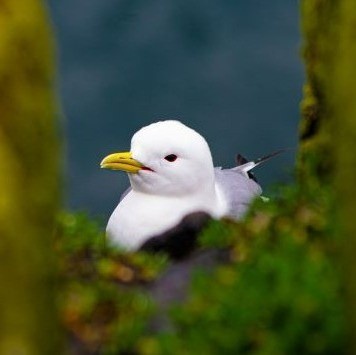
Research PG
- About
-
- Email Address
- c.cargill.21@abdn.ac.uk
- School/Department
- School of Biological Sciences
Biography

Kittiwake, Isle of May I am an early-career researcher and ornithologist primarily concerned with the conservation of coastal and pelagic taxa. I am currently studying towards a PhD in Biological Sciences, under a SUPER DTP CASE Scholarship, entitled, “Towards enhanced black-legged kittiwake (Rissa tridactyla) metapopulation modelling in the context of global change and renewable energy development”. The project aims are to use genetic data to quantify how breeding colonies of kittiwakes are connected across different spatial and temporal scales, and to apply such data to Bayesian metapopulation models.
I hold a Master’s degree in Marine Ecosystem Management and an Honours degree in Conservation Biology and Ecology. Prior to this position I consolidated my fieldwork and analytical skills by working with charitable organisations and non-governmental bodies, covering a range of species from the Spheniscidae, Procellariidae and Charadriidae families. I continue to work remotely with a small team of landowners, ornithologists and geologists concerned with preserving the remaining breeding colonies of Hutton’s shearwater (Puffinus huttoni) in New Zealand.

In tandem to my research interests, I am an advocate for proactive attitudes towards empowering young people through education. I maintain a partnership with UK STEM Ltd., with whom I develop teaching resources linking science, technology, engineering, and mathematics as learnt at school to engaging, real-world careers in sustainability and conservation for use in the UK STEM Global STEM Award.
Personal statement: I believe that I have the ability to play an active part in defining the manner in which the UK progresses towards a sustainable future. I find it imperative that such progress is fully informed, cooperative and takes all necessary action towards mitigating human-wildlife conflict.
Qualifications
- MSc Marine Ecosystem Management2021 - University of St. Andrews
- Bsc (Hons) Conservation Biology and Ecology2018 - University of Exeter
- Research
-
Current Research
Towards enhanced black-legged kittiwake metapopulation modelling in the context of global change and renewable energy development. 2021 - Present.
Conference presentations
Using Genetic Estimates of Connectivity to Explore Appropriate Spatial Scales for Offshore Windfarm Impact Assessments: an Ecosystem-Based Case Study for the Black-legged Kittiwake. Oral presentation. International Council for the Exploration of the Seas ASC. Bilbao, Basque Country, Spain. September 2023.
Quantifying Connectivity Between North Atlantic Black-Legged Kittiwake Populations Towards Evidence-Based Renewable Energy Development. Poster presentation. 15th International Seabird Group Conference. Cork, Ireland. August 2022.
Summary
A comprehensive understanding of population connectivity in marine species is required for sustainable, ecosystem-based marine spatial planning. The black-legged kittiwake is a conservation priority seabird of international importance. Historic analyses demonstrate that kittiwakes emigrate over short and long distances, yet there remains a lack of knowledge of their dispersal and colony source-sink dynamics at differing temporal and spatial scales. This is currently contributing to high uncertainty in Environmental Impact Assessments (EIAs) and Habitats Regulations Appraisals (HRAs) underpinning the planning and licensing of offshore wind developments in the North Sea. The overarching goal of this research is to identify, and thus facilitate the protection of, local populations with disproportionate contribution to the establishment and maintenance of UK and North Sea kittiwake colonies. Furthermore, we aim to facilitate appropriate high level management decisions towards protecting colonies likely to interact with future offshore wind developments. The outcomes of this research will have a direct impact on policy laying the foundations for the UK to become a world leader in green energy production. This project is a SUPER CASE Doctoral Training Partnership and research collaboration between the University of Aberdeen, the University of the Highlands and Islands, Joint Nature Conservation Committee, Marine Scotland Science.
Supervisors: Beth E. Scott (UoA), Ana Payo-Payo (UoA), Kara Layton (UoA), Elizabeth Masden (UoH&I), Lise Ruffino (JNCC), Julie Miller (MSS)
Project collaborators: Signe Christensen-Dalsgaard (Norwegian Institute for Nature Research), Karen McCoy (French National Centre for Scientific Research), Ella Benninghaus (University of Aberdeen)
Conservation status of the Hutton's Shearwater (Puffinus huttoni) colony at Shearwater Stream, Kaikōura, New Zealand. 2019 - Present.
Publications
The conservation status of Hutton’s shearwater (Puffinus huttoni) at Shearwater Stream, Kaikōura, New Zealand: a small population at risk? Cargill, C.P., Townsend, D., McArthur, N.R., Morgenstern, R., Morrissey, M., Sherley, G. and Bell, M. 2023. Notornis. 70(1):1
Summary
I am part of a working group dedicated to establishing the status and viability of the remaining breeding colonies of Hutton’s shearwater in the Kaikōura Seaward Ranges, New Zealand. This project is a research collaboration between Puhi Peaks Station, Wildlife Management International and GNS Science. This project is funded by Puhi Peaks Station and the New Zealand Department of Conservation.
Past Research
2020
Mapping the distribution of little penguins (Eudyptula minor) along the greater Kaikōura coastline, New Zealand.
2019
Monitoring little penguin (Eudyptula minor) breeding success in a small Kaikōura colony, New Zealand.
Knowledge Exchange
Explorathon Aberdeen 2023 - a collaborative interdisciplinary public engagement event with UK STEM Ltd, the Sea Mammal Research Unit (SMRU, University of St Andrews) and the University of Aberdeen Public Engagement with Research Unit (PERU).
Funding and Grants
2024
Scottish Universities Partnership for Environmental Research (SUPER). SUPER-NERC Research Experience Placements (REPs), summer 2024: Insights into contemporary population connectivity of the Atlantic black-legged kittiwake: A snapshot at the ocean-basin scale. £4,150
2023
Scottish Universities Partnership for Environmental Research (SUPER)/UKRI. Diversifying the Talent Pipeline Flexible Funding Award. £11,450. Part of a larger project led by SUPER DTP.
Norwegian Institute for Nature Research (NINA)/Equinor. Kittiwakes breeding on offshore oil installations. 65,000 NOK / £4,828.73. Part of a larger project led by NINA.
Challenger Society for Marine Science Travel Award. £215
British Ecological Society Training and Travel Award. £500
International Council for the Exploration of the Sea Early Career Researcher Travel Grant. €500 / £433.69
British Trust for Ornithology Research Grant and The Seabird Group Research Grant (equal co-funders). Pioneering an international collection of non-invasive biological samples for the North Atlantic black-legged kittiwake. £1,000 total.
2022
Marine Alliance For Science and Technology for Scotland (MASTS) and Scottish Funding Council (SFC) Saltire Emerging Researcher Scheme European Exchange. A pilot study towards understanding the connectivity of United Kingdom and Norwegian black-legged kittiwake populations across the North Sea. £2,350
2021
Scottish Universities Partnership for Environmental Research (SUPER) Doctoral Training Programme Scholarship. 'Towards enhanced black-legged kittiwake metapopulation modelling in the context of global change and renewable energy development'.
Funded by the UK Research and Innovation (UKRI) Natural Environment Research Council (NERC), the University of Aberdeen, the Joint Nature Conservation Committee (JNCC) and Marine Scotland Science (MSS), this studentship comprises a research collaboration between the University of Aberdeen, the University of the Highlands and Islands, JNCC and MSS.
